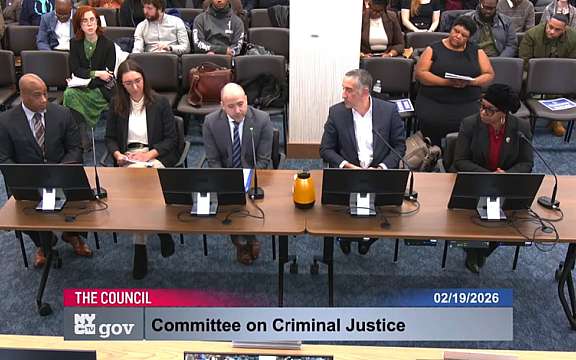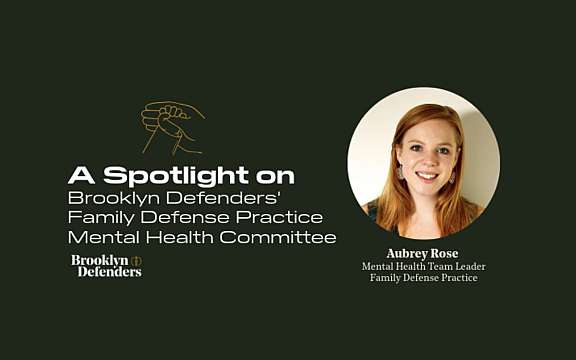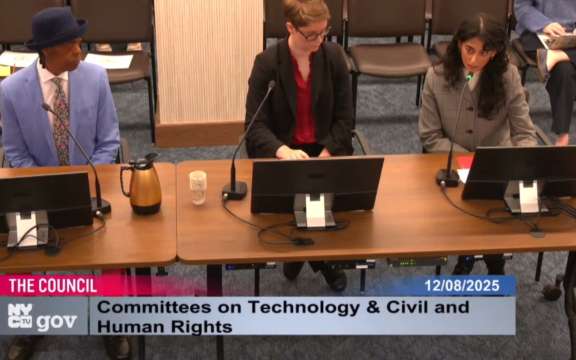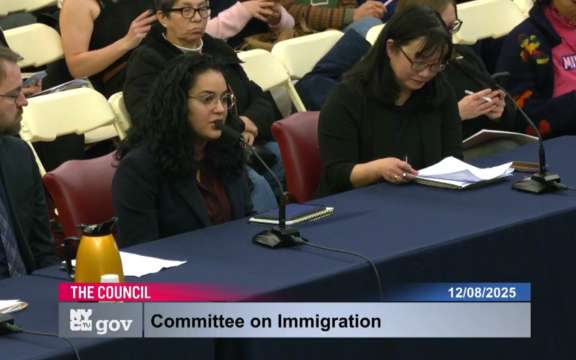BDS Testimony Before The New York City Council Committee on Public Housing on Safety and Security in NYCHA
TESTIMONY OF:
Maia Cole–Skadden Fellow, Civil Justice Practice
BROOKLYN DEFENDER SERVICES
Presented before:
The New York City Council Committee on Public Housing Oversight Hearing on Public Safety at NYCHA
February 24, 2021
My name is Maia Cole and I am a Skadden Fellow with the Civil Justice Practice at Brooklyn Defender Services (BDS). BDS provides multi-disciplinary and client-centered criminal, family, and immigration defense, as well as civil legal services, social work support, and advocacy, for nearly 30,000 clients in Brooklyn every year.
BDS’ Civil Justice Practice (CJP) aims to reduce the civil collateral consequences for our clients who have had interaction with the criminal, family, or immigration legal systems. Through legal advocacy in court and at various agencies, CJP helps people remain in their homes, maintain their public benefits, stay in school, keep their jobs, and protects their consumer rights. We also provide advice and technical support to our criminal and family defense attorneys and clients aimed at minimizing potential civil ramifications of involvement with these systems. In this work, we routinely assist clients in a wide range of interactions with NYCHA, including defending residents facing the termination of their tenancies due to allegations of criminal conduct by a household member or guest of the family, advocating for family-court-involved clients to be approved for NYCHA housing to facilitate reunification, and pushing for the safety transfers or repairs necessary to ensure our client’s homes are safe for their families to live in.
I thank the Committee on Public Housing and Chair Alicka Ampry-Samuel for the opportunity to testify today about safety and security in NYCHA developments and to share the stories of some of our clients who have been caught up in the housing authority’s flawed efforts to make public housing safer.
Introduction
Our office represents NYCHA residents who often describe feeling unsafe at home. But the people we serve and their communities at NYCHA are not made safer by an increased police presence. In 2014, Mayor de Blasio launched the Mayor’s Action Plan for Neighborhood Safety (MAP) to improve public safety at fifteen NYCHA developments by investing in all aspects of the community. But in practice, the effect of MAP was to increase the policing of NYCHA residents. Indeed, residents at these fifteen developments, including many of our clients, experience regular police harassment, and at the same time, have seen their community centers close and their buildings remain in a state of disrepair. Increased policing causes further harm to NYCHA families, many of whom face tenancy terminations and evictions based on even minimal contact with the police. We are grateful for the opportunity to share some of their stories today.
Where a society allocates its budget is a statement of its values. We ask you to carefully consider the message it sends to NYCHA residents when the City fails to make necessary building repairs but can afford to pay the officers who terrorize their communities, or when community centers close and the Summer Youth Employment Program is cancelled while the NYPD blows past its annual overtime allotment by $100 million yet again. While the MAP program promised NYCHA residents increased opportunities for work, play, development, and health, the only change our clients have reported is an increased presence of police.
The NYCHA residents we serve report repeated harassment by the police for minor issues or for no reason at all. Residents describe being stopped and/or arrested for small infractions—jaywalking, littering, marijuana possession. We already know that this strategy of broken windows policing is not effective at reducing crime and promoting safety. Residents do not feel that the police are there to build or improve their community, but to do exactly the opposite. As a result, a lack of trust in police pervades NYCHA communities. At the same time, the police do not protect the NYCHA residents we serve from violence. Many young residents have multiple friends who have been killed and whose murders remain unsolved.
The poor conditions of the buildings further harm the health and safety of NYCHA residents. Despite continued promises to improve conditions, residents are exposed to toxins such as lead, asbestos, and mold; they suffer through lack of heat in the winter; and they face infestations of rats, mice, and roaches. Without improving these conditions across NYCHA developments, it will be impossible to meaningfully improve residents’ health and safety.
Client Stories
Ms. R is a lifelong resident of one of the MAP developments and has experienced her home change dramatically over the past forty years. Since MAP launched, and especially this past summer, she has seen more police at her development. Rather than building connections with residents, the officers antagonize and intimidate them, young adults and children in particular. Ms. R’s young-adult son and his friends are yelled at for sitting on benches at their development. The police frequently bring them into the precinct to question them about their friends and try to foment conflict. As Ms. R described it, the police see her son and his friends as guilty, regardless of anything they have done. Ms. R feels unsafe at her home precisely because there are more police.
At the same time, the young residents of Ms. R’s development no longer have their own community center where they can spend time, building positive relationships and skills. The community center that Ms. R grew up with has been privatized, and her son and his friends do not go there. In addition, the conditions of Ms. R’s building have deteriorated. She has a persistent rat problem. The lighting is poor—the bright “safety lights” installed as part of MAP are no longer there, and the ever-present scaffolding makes the development grounds even darker.
Ms. H, another resident at a MAP development, has personally experienced police harassment. Police officers have told that they are monitoring her Instagram account and have mode sexually explicit comments to her. Unsurprisingly, she feels unsafe in and around her home. Her young children already have nightmares about the police. Compounding the problem of police harassment, Ms. H’s development has minimal lighting, asbestos, lead, and other toxins, all of which harm her health and safety.
It is clear that unsafe conditions and building disrepair have the most significant impact on our clients’ sense of safety and security in their homes. Ms. S was thrilled to get approved for a NYCHA apartment in 2018 after years on the waiting list. However, it was immediately apparent that the conditions in her apartment were unsafe for her young daughter, whose severe asthma was exacerbated by mold and mildew. She has been fighting for repairs in her apartment since she moved in, but the mold has returned repeatedly because the underlying structural problem, a pipe leak in the ceiling, has not been addressed.
Many more of our clients have shared similar stories with us but do not want to come forward because they justifiably fear retaliation by the police.
NYCHA’s Trespass List
As part of the regular harassment by law enforcement that NYCHA residents face, police officers regularly question residents’ right to be in their own buildings, to spend time with friends, and to visit their families. NYCHA and the NYPD have a “trespass” or “not wanted” list. Anyone with a felony drug sale arrest on NYCHA property is put on that list. Once someone is on the trespass list, they are considered banned from NYCA property and can be arrested for being on NYCHA property at any point, even if they are a NYCHA resident.
NYCHA accepts without question the NYPD’s characterization of someone’s conduct by using the arrest charge to determine who is placed on the trespass list. People whom the District Attorney decline to prosecute, people hose charges are dismissed, sealed, or resolved without a criminal conviction, people who merely had drugs for personal use and not sale—all can end up on the trespass list. They all can be arrested simply for coming back to their home.
The trespass list reflects NYCHA’s and NYPD’s broader policy of over-policing and criminalizing NYCHA residents. Trespass is already unlawful. If someone who is not a NYCHA resident trespasses on NYCHA property, they can be penalized without resorting to the punitive trespass list. But with the trespass list, NYCHA can criminalize and harass its own residents.
Termination of Tenancy Proceedings
NYCHA aggressively pursues termination of tenancy proceedings against residents who allegedly engage in “non-desirable” behavior. Often, NYCHA learns about an arrest on its property and uses that as a basis to begin termination proceedings against the household involved. NYCHA will initiate proceedings while the criminal case is still pending; they do not wait to see if the criminal case is resolved favorably. The pretext for this is the importance of getting “dangerous” tenants out of public housing. The real reason is that once a criminal case ends favorably, the arrest records are sealed and cannot be used in a termination proceeding. While a case is pending, however, NYCHA is able to pursue the termination and eviction.
In the name of public safety, NYCHA will terminate the tenancies of lifelong NYCHA residents based on minor infractions or criminal charges that are ultimately dropped. Often, the arrest underlying the termination proceeding was not even of a NYCHA resident; we frequently see NYCHA tenants facing termination because a friend or family member who does not live in NYCHA was arrested. In these situations, NYCHA will evict an entire household when no one in the household was even accused of criminal activity.
NYCHA attorneys have broad discretion in pursuing termination of tenancy. They could use that discretion to examine whether an arrest was warranted, whether the provable allegations indicate that a tenant is a risk to other residents, and the tenant’s history at NYCHA before considering termination as an option. Instead, NYCHA attorneys use their discretion to pursue termination in nearly all cases. Termination is about punishment, not public safety.
Indeed, if the purpose of termination of tenancy proceedings was to improve public safety, the tenant’s history with NYCHA and their relationship with their community and management office should be a primary focus of any investigation. Relatedly, NYCHA should invest in improving and expanding community resources to support residents and avoid future issues. As a comparison, the DA’s office in Brooklyn frequently works with clients to pursue programs that allow for non-criminal dispositions. These programs have proven to reduce recidivism and prevent the devastating consequences of a conviction. But, for the vast majority of cases ,NYCHA makes no such effort to work with families to keep their tenancies.
Recommendations
The focus of this hearing is on public safety at NYCHA, and I urge the Council to think broadly about what public safety means. Right now, we are experiencing an unprecedented public health crisis, which has taken its worst toll on Black and Latinx communities, and low-income communities. The pandemic has laid bare our country’s disinvestment in communities of color, and this is precisely the situation for NYCHA residents.
Public safety at NYCHA must include investment in the communities rather than investment in policing. This includes improving the physical structure of NYCHA developments so that residents are not exposed to dangerous and unsanitary conditions. This also includes rebuilding and maintaining community centers at NYCHA that are publicly run and for NYCHA residents, giving young residents in particular somewhere to spend time, building positive relationships and skills. Finally, this includes revitalizing youth employment programs, which have been increasingly underfunded, but which provide critical opportunities for many young NYCHA residents. Given the problems with increased police contact, NYPD-run youth programs are a poor substitute for community-led programs.
In addition, NYCHA should invest in alternatives to policing and criminalization. Termination of tenancies should not happen, and if they do, they should be NYCHA’s absolute last resort. Instead, NYCHA could make credible messengers and social workers available to work with residents or give residents alleged to have engaged in non-desirable activity the option to enroll in programs. Doing so would make the entire NYCHA community safer—unlike current punitive termination policies—by restoring trust in NYCHA and eliminating some of the factors leading to arrests in the first place.
We support NYCHA’s efforts to undo some of its barriers to serving New Yorkers who have been impacted by the criminal-legal system through their Family Reentry program. But we urge NYCHA to go further. So far, NYCHA has admitted 166 people into their Family Reentry program. For these 166 families, the program has been life changing. Yet there are thousands more people who would undoubtedly benefit from being reunited with their families in NYCHA after incarceration. NYCHA should encourage more people to apply to the Family Reentry program and expand its eligibility criteria to the programs so that it is not just limited to reuniting immediate family members. Doing so would ensure that more people coming out of incarceration have a place to stay, improving public health and safety across the city.
NYCHA does not have unlimited resources. Instead of spending them on increased policing and punitive termination proceedings that have no demonstrable impact on residents’ safety, NYCHA should invest those resources in its residents, in improving building conditions, and in providing opportunities to support and strengthen their communities. Such strategies will meaningfully improve public safety at NYCHA.
We thank the City Council for your attention and care regarding these issues. We hope you consider BDS a resource as we continue to work toward improving public housing. If you have any question, please feel free to contact Alexandra Dougherty, Senior Staff Attorney and Policy Counsel, at adougherty@bds.org.



